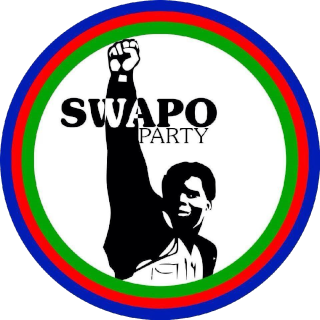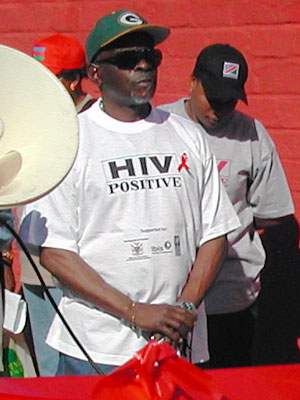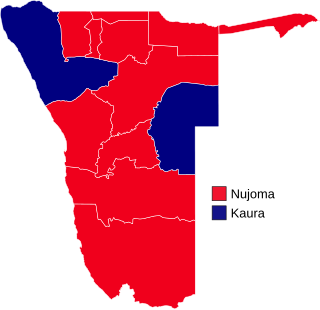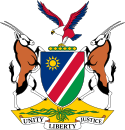
Politics of Namibia takes place in a framework of a semi-presidential representative democratic republic, whereby the President of Namibia is both head of state and head of government, and of a pluriform multi-party system. Executive power is exercised by both the president and the government. Legislative power is vested in the two chambers of Parliament. The judiciary is independent of the executive and the legislature.

The South West Africa People's Organisation, officially known as the SWAPO Party of Namibia, is a political party and former independence movement in Namibia. Founded in 1960, it has been the governing party in Namibia since the country achieved independence in 1990. The party continues to be dominated in number and influence by the Ovambo ethnic group.
Hidipo Livius Hamutenya was a Namibian politician. A long time leading member of the South West Africa People's Organization (SWAPO), Hamutenya was a member of the Cabinet of Namibia from independence in 1990 to 2004, serving in several important ministerial portfolios. He was defeated in a bid for the party's presidential nomination in 2004 and left SWAPO to form an opposition group, the Rally for Democracy and Progress (RDP), in 2007. He was elected to the National Assembly of Namibia with RDP in the 2009 general election. He was forced to step down as RDP president on 28 February 2015 and rejoined SWAPO on 28 August 2015.

Hifikepunye Lucas Pohamba is a Namibian politician who served as the second president of Namibia from 21 March 2005 to 21 March 2015. He won the 2004 presidential election overwhelmingly as the candidate of SWAPO, and was reelected in 2009. Pohamba was the president of SWAPO from 2007 until his retirement in 2015. He is a recipient of the Ibrahim Prize.

Elections in Namibia determine who holds public political offices in the country. Namibia is a semi-presidential representative democratic republic. It runs direct elections every five years for the position of the president and seats in the National Assembly, and every six years for the Regional Councils and the distribution of seats in local authorities. The National Council is elected indirectly by the constituency councillors of Namibia's 14 regions.

Nahas Gideon Angula is a Namibian politician who served as the third Prime Minister of Namibia from 21 March 2005 to 4 December 2012. He was succeeded by Hage Geingob in a cabinet reshuffle after the 2012 SWAPO Party congress. He subsequently served as Minister of Defence from 2012 to 2015.

Hage Gottfried Geingob was a Namibian politician who served as the third president of Namibia from 2015 until his death in February 2024. Geingob was the first Prime Minister of Namibia from 1990 to 2002, and served as prime minister again from 2012 to 2015. Between 2008 and 2012 Geingob served as Minister of Trade and Industry.In November 2014, Geingob was elected president of Namibia by an overwhelming margin. In November 2017, Geingob became the third president of the ruling SWAPO Party after winning by a large margin at the party's sixth Congress. He served as the party's president until his death. In August 2018, Geingob began a one-year term as chairperson of the Southern African Development Community.
Benjamin Ulenga is a Namibian trade unionist, politician, and diplomat. In the 1990s, he served under the SWAPO government as a deputy minister and as an ambassador, but he left SWAPO in 1998 and founded an opposition party, the Congress of Democrats (CoD), in 1999. He was a member of the National Assembly of Namibia from 2000 to 2015 and led the CoD until 2015.
Gibeon is a village in Gibeon Constituency in the Hardap Region of Namibia.

General elections were held in Namibia on 15 and 16 November 2004 to elect the President and National Assembly. The National Assembly election resulted in a landslide win for SWAPO, which won 55 of the 78 seats with over 75% of the vote. SWAPO's candidate for president, Hifikepunye Pohamba, won the presidential election. Following his victory, Pohamba was sworn in as president on 21 March 2005 at Independence Stadium in Windhoek.
Jerry Lukiiko Ekandjo is a Namibian politician, former anti-apartheid activist and political prisoner. He is one of the founding members of the SWAPO Youth League and has been one of the most active internal leading members of the South West Africa People's Organization (SWAPO) during the liberation struggle. He spent eight years in prison on Robben Island after being charged for inciting violence in 1973.

General elections were held in Namibia on 30 November and 1 December 1999 to elect a president and the National Assembly. Voting took place over two days, after the Commission was persuaded by protests from political parties that a single polling day would be insufficient to accommodate travel to polling stations by voters in remote areas.
Pendukeni "Penny" Iivula-Ithana is a Namibian politician who served as the secretary general of SWAPO, Namibia's ruling party, from 2007 to 2012. She was a member of the Constituent Assembly of Namibia in 1989 and has been a member of Parliament and member of cabinet since independence in 1990.

General elections were held in Namibia on 27–28 November 2009. They were the fourth general elections since independence and the fifth democratic elections. Voting ended on 28 November and official election results, released on 4 December, showed that Hifikepunye Pohamba and his SWAPO Party were re-elected, each with over 75% of the vote. Prior to the election, the South West Africa People's Organization (SWAPO) was widely expected to score a landslide victory, with the Rally for Democracy and Progress (RDP) considered SWAPO's biggest challenger. Fourteen political parties competed for seats in the National Assembly of Namibia, and twelve candidates ran for the presidency.
Kazenambo Kazenambo, commonly known as KK, was a Namibian politician.

The Constitution of Namibia is the supreme law of the Republic of Namibia. Adopted on 9 February 1990, a month prior to Namibia's independence from apartheid South Africa, it was written by an elected constituent assembly.

General elections were held in Namibia on 27 November 2019. Ballots were cast using electronic voting. A total of eleven candidates ran for the presidency and fifteen political parties contested the National Assembly elections.
Events in the year 2014 in Namibia.













